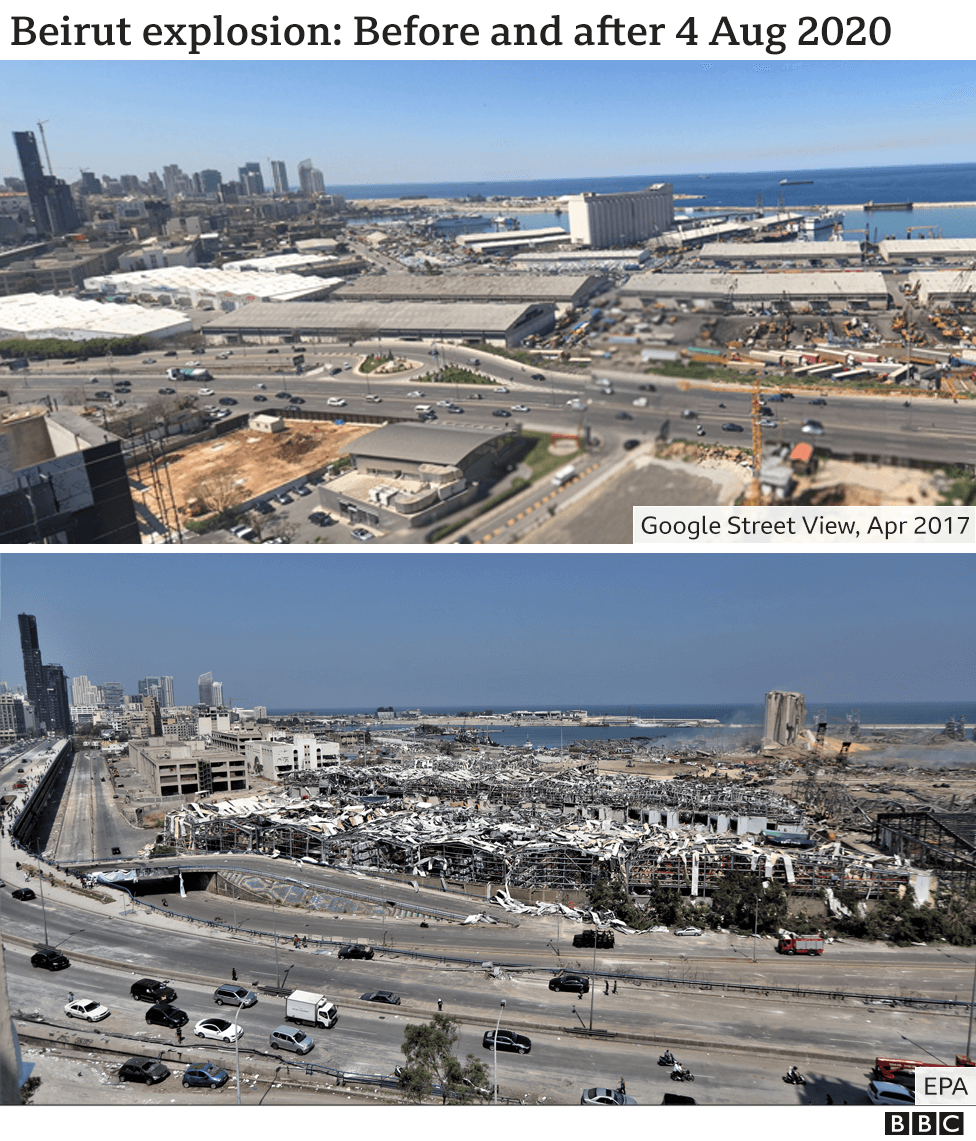A violent clash took place between the protestors and riot police near the Lebanon parliament in Beirut. Thousands of protestors gathered at the Beirut’s main square demanding that the officials should be hanged on over the catastrophic Beirut blast on August 4.
The Lebanese army has issued a statement on its official Twitter account asking protesters not to vandalize public or private property.
تعرب قيادة الجيش عن تفهمها لعمق الوجع والألم الذي يعتمر قلوب اللبنانيين وتفهمها لصعوبة الأوضاع الذي يمر بها وطننا، وتذكّر المحتجين بوجوب الالتزام بسلمية التعبير والابتعاد عن قطع الطرق والتعدي على الاملاك العامة والخاصة، وتذكّر أن للجيش شهداء جراء الإنفجار الذي حصل في المرفأ pic.twitter.com/mpFVwXxFiP
— الجيش اللبناني (@LebarmyOfficial) August 8, 2020
The statement reads, “The Army’s command expresses its understanding of the pain that is in the hearts of the Lebanese people…and reminds the protesters of the obligation to adhere to peaceful means of expression, and refrain from blocking roads and encroaching on public and private property.”
Amid the rising protests in the country Lebanon’s Prime Minister, Hassan Diab has called for early polls after the lethal blast on August 4, saying it’s the only way out of the country’s crisis.

The PM addressed the nation and said he will present a draft bill proposing early elections as thousands of angry protesters took to the streets. “We can’t exit the country’s structural crisis without holding early parliamentary elections…We need a new political elite and a new parliament,” Diab said. He added that a national investigation into the matter will extend until it gets to “everyone involved” in the explosion.
The Lebanese government has announced a two-week state of emergency.
What happened in Beirut?
A pair of explosions took place at the port of the city of Beirut, the capital of Lebonan on the evening of August 4. The impact of the second blast was so tremendous that it was felt in Cyprus which is around 200 KM away from Beirut.
The blast has resulted in at least 160 fatalities with more than 6000 people wounded. Head of the Lebanese Red Cross, George Kettani said, “What we are witnessing is a huge catastrophe, there are victims and casualties everywhere.”
https://www.instagram.com/p/CDeY8V5jiIZ/?igshid=1rqph4y0yygz9
The second blast sent a billowing, reddish plume high above the city’s port and created a shock wave that shattered glass at Beirut International Airport’s passenger terminal, about 9km away from the port. The seismologists at the United States Geological Survey said the detonation generated shockwaves equivalent of a 3.3-magnitude earthquake that reached Turkey, Syria, Israel, and parts of Europe.
Beirut Governor, Marwan Abboud, said as many as 3,00,000 people had been made tentatively homeless and that collective damages might reach US$10-15 billion.
Shattered glasses, deformed elements, and all sorts of wreckage have made the centre of the Beirut look like a warzone.
Cause of the Explosion
The cause of the explosion is expected to be the 2,750 tonnes of ammonium nitrate which had been stored unsafely at a warehouse in the port. The ammonium nitrate that exploded arrived in a Russian-owned Moldovan-flagged cargo ship, the MV Rhosus, which docked in Beirut after suffering technical problems while sailing in November 2013 from Georgia to Mozambique.

The MV Rhosus was scrutinised, banned from leaving and was shortly afterward abandoned by its owners, according to Shiparrested.com. Its shipload was reportedly shifted to Warehouse 12 following a court order and should have been disposed of or resold.
Cognizant of the hazards the port authorities had been writing letters to the government since 2014. The director-general of Lebanese Customs, Badri Daher, stated that their warnings about the menace sat by the stored ammonium nitrate and requests for it to be removed were repeatedly ignored. “We requested that it be re-exported but that did not happen. We leave it to the experts and those concerned to determine why”, Mr. Daher told broadcaster LBCI.
The port authorities also suggested donating the chemical to the Lebanese Army or sell it in the chemical market. For 6 years they have not been heard, until now!
Reports suggest that fire seems to have triggered the explosion of the ammonium nitrate in Beirut. Lebanese broadcaster LBCI and Reuters news agency referred sources as saying the fire was started by welding work being carried out on a hole in Warehouse 12.
The port’s general manager, Hassan Koraytem, validated that maintenance was conducted on the door of the warehouse before the blast. CNN quoted him as telling OTV, “We were asked to fix a door of the warehouse by State Security and we did that at noon, but what occurred in the afternoon I have no idea.”
Investigation
The Lebanese government has formed an investigation committee led by the Prime Minister, Hassan Diab, that will submit its findings to the Council of Ministers of Lebanon by 11 August.

President, Michel Aoun, promised a transparent investigation by Lebanese authorities and to “hold those responsible and those who were negligent accountable, and serve them the most severe punishment”.
Aoun told reporters in Beirut that the investigation is to examine whether the explosion was an accident or due to negligence and if it was caused by a bomb or another external interference.
However, calls for international investigation have risen since then. The President declined appeals for an international inquiry despite demands from world leaders saying, “The goal behind calls for an international investigation into the port issue is to dilute the truth.”
The deteriorating condition of Lebanon
Long ere the pandemic, Lebanese people had been crying for reforms. Corruption in the country is out of control resulting in it being the third-highest indebted country in the world. Over 30% of Lebanese live below the poverty line. The country’s currency is plunging its value, 85% of the value is lost in less than a year. The influx of refugees from neighbouring Syria. The coronavirus pandemic has profoundly effected the healthcare system of the country leaving millions of children going hungry every day.
Aid for Lebanon
These are comments coming from the Lebanon people themselves. “If you or your country’s leaders want to donate, please do not donate directly to the Lebanese government. They’ve stolen from us before and they will do it again. Find independent organisations. Please let people know. The bigger the International pressure, the more likely our corrupt politicians will be held accountable!”
Below are the links where you can donate to support Lebanon;
Lebanese Food Bank- https://donate.lebanesefoodbank.org/en-US/donate/1/
Lebanese Red Cross- https://www.supportlrc.app/donate/donate.html
Just Giving- https://www.justgiving.com/crowdfunding/lebanon-relief
The year 2020 has been very dreadful so far. Every morning we wake up to a piece of appalling news from some corner of the world. Let’s be kind to everybody. Let’s stand united for one another.




